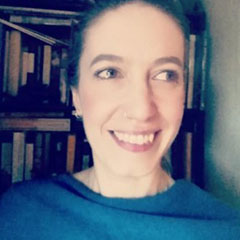Helen Metcalfe, Postdoctoral Fellow, Department of History
Helen is a Wellcome Humanities and Social Science Postdoctoral Fellow in the Department of History.

She is a social and cultural historian of late-Georgian Britain. Her research focuses on the history of the emotions, gender and the body, sensory history and embodiment, and engages with the history of the home and the family, domestic material culture, identity and the self.
email: helen.metcalfe
Our 60-second interview with Helen:
Could you please tell us what work you do in the field of mental health?
My postdoctoral research is a multidisciplinary project examining experiences of grief and loss in late-Georgian society, when this emotion was recognised on much broader terms than tends to be the case today. The project widens the lens through which we view historical experiences of grief and seeks to disrupt current understandings of grief as ‘unhealthy’.
What do you find most rewarding and inspiring in this work?
Much of my time is spent conducting archival research analysing papers from over two hundred years ago, so I don’t get to experience the transformative effects of direct interventions with individuals in the ways that practice-based academics might. I do, however, look forward to a time when I can work with students on the history of emotions, as their input and engagement with my research will then bring countless new rewards. I find discussing my research with colleagues frequently rewarding, and I’m always grateful for the feedback I receive. I have also been inspired by conversations with friends and family, whose openness to re-examine their relationship with grief reminds me of how impactful our work as historians can be.
What is the most challenging or complicated aspect of this work?
I don’t have a background in mental health research, but incorporating research from a wide range of disciplines is central to my work on grief. This approach does of course come with certain challenges when your roots are predominantly in historical research – namely, juggling so many conceptual ideas where the intersections with your own work are both relevant and exciting, but are often difficult to bring together coherently.
What impact do you hope your work is having - or can potentially have?
In terms of academia, I hope to redraw the lines around which long-held associations with grief have located it predominantly with the immediate emotional upheaval associated with death, thus enriching current analyses of this complex emotion across both the humanities and the social sciences. Using my historical research as a springboard, I also hope to generate a much wider conversation outside of academia about the various ways in which we can experience grief in order to better understand our emotions and thus help improve our mental health and wellbeing.
Could you share with us one piece of advice that you follow for your own mental health?
I’m a huge believer in the phrase ‘better out than in’, as suppressing our emotions will always be detrimental to our mental health. So be honest with yourself and those closest to you about how you feel.